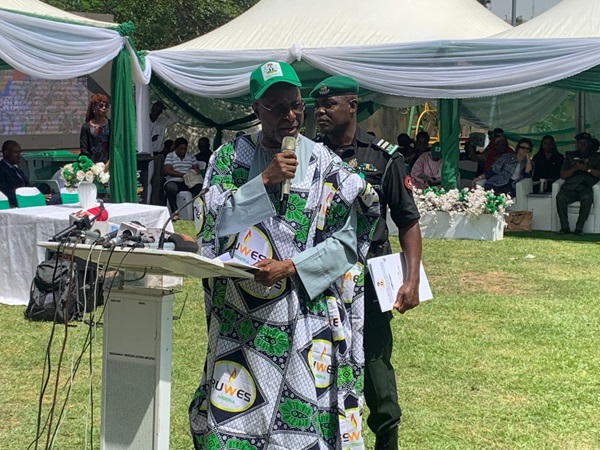
The Federal Government has reiterated its commitment to creating a cleaner, greener and more resilient environment for all Nigerians by taking decisive steps to tackle plastic pollution at every level of society.
The Minister of Environment, Balaraba Lawal gave this assurance during the 2025 World Environment Day commemoration in Abuja, themed “Ending Plastic Pollution,” where she emphasised that plastic pollution has grown into not only an environmental crisis but also an economic and public health threat that demands urgent and collective action.
Lawal explained that every minute, tonnes of plastic waste find their way into oceans, rivers, and city drainage systems, choking marine life, blocking waterways and contributing significantly to flooding in urban areas. She linked frequent flooding in cities to human activities like indiscriminate waste disposal and poor urban planning and stressed that these issues could be mitigated through proper waste management and sustainable design.
She acknowledged that the scale of plastic waste in Nigeria remains daunting, with urban and rural communities alike overwhelmed by discarded sachet water bags, plastic bottles and other waste items that pollute streets, clog drains and release microplastics into the food chain, raising health concerns for millions.
The minister assured the public that the government is implementing a robust national policy on plastic waste management, which has received council approval and is backed by a clear framework to guide action. The policy promotes the well-known “Three Rs” – reduce, reuse and recycle – as the backbone of a sustainable waste management strategy.
She explained that using less plastic, finding ways to reuse materials, and ensuring that what is used gets recycled can significantly curb the plastic menace and protect ecosystems.
To ensure that producers also play their part, Lawal announced that the Extended Producer Responsibility (EPR) Programme has been rolled out. This programme compels manufacturers to take responsibility for their products throughout their entire lifecycle, from production to safe disposal.
She highlighted that the ministry is working with stakeholders across government, industry and civil society to ensure that policies translate into real impact, adding that no government can win the war on plastic pollution alone. She encouraged local communities and youths to participate actively by collecting discarded plastics and sachet water bags from streets, turning waste recovery into a source of livelihood and poverty alleviation.
The permanent secretary of the Federal Ministry of Environment, Mahmud Kambari underlined that plastic pollution is a rapidly growing global crisis threatening ecosystems, public health and economic well-being. He said that in Nigeria, the consequences are particularly devastating, worsening urban flooding, harming wildlife, and jeopardising human health. Kambari urged all stakeholders to ramp up efforts through stronger policies, public education and investment in sustainable alternatives to single-use plastics.
In a goodwill message, the commissioner for economic affairs and agriculture at ECOWAS, H.E. Massandje Toure-Litse cautioned the public against heating lightweight plastic containers in microwaves, pointing out that such practices release hydrocarbons that increase cancer risk.
He revealed that West Africa generates nearly eight million metric tonnes of plastic waste annually, with more than 80 per cent of this waste poorly managed. He stressed that plastic pollution crosses borders and requires a unified regional approach. ECOWAS, he said, has adopted a new regulation on plastics management, urging member states to align their laws and embrace best practices to tackle the crisis. Countries like Ghana, Nigeria, Senegal and Côte d’Ivoire, he added, are implementing measures such as plastic bag bans and circular economy initiatives.
UNICEF Nigeria’s Chief of WASH, Dr. Jane Bevan echoed the call for urgent action, especially to protect children and youth who bear the brunt of environmental hazards. She highlighted UNICEF’s Green Rising initiative, which aims to empower 20 million young people globally and has already spurred more than 100,000 green actions in Nigeria.
She urged everyone to work together to secure a safe, sustainable environment for future generations.
Senior vice-president of corporate services at Oando Clean Energy Limited (OCEL), Alero Balogun described plastic pollution as a daily reality that clogs drains, pollutes waterways and destroys livelihoods, especially in communities with weak environmental safeguards.
She spoke about OCEL’s flagship project in Ogun State, which processes 2,750 metric tonnes of PET plastic monthly, creating jobs and promoting a circular economy. She also noted OCEL’s commitment to advancing clean energy solutions like electric buses for Lagos to further reduce environmental impact and applauded the Rural Women Energy Security initiative for mobilising women nationwide.
Managing director of ZoomLion Nigeria, Habiba Abubakar urged all Nigerians to embrace collective action to turn plastic waste into a resource and champion women’s empowerment in driving environmental innovation.
She reaffirmed ZoomLion’s dedication to tackling plastic pollution through inclusive, community-driven approaches that provide jobs in recycling, waste recovery and technical training.
With stronger partnerships between government, industry, civil society and local communities, Nigeria aims to transform its plastic pollution challenge into an opportunity for greener growth and sustainable development.

